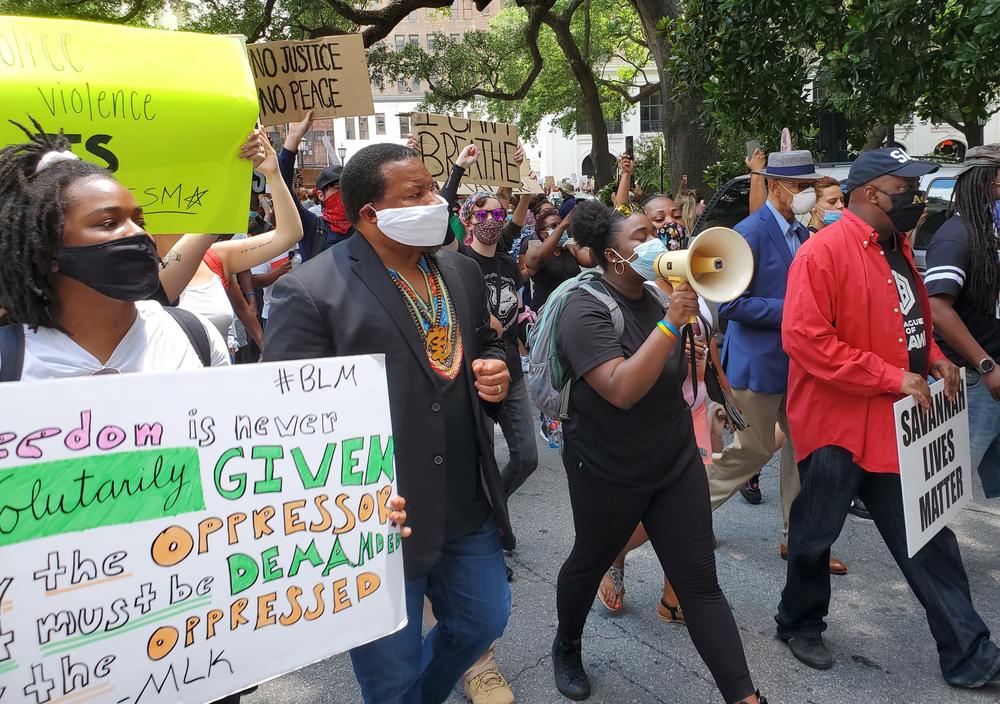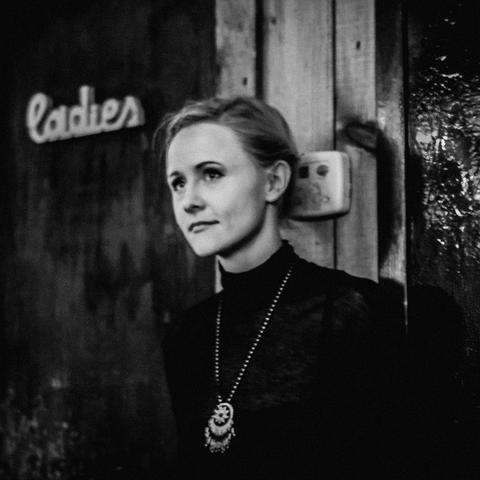Section Branding
Header Content
Savannah Mayor Van Johnson On Handling COVID-19, Racial Justice And More — In His First 6 Months
Primary Content
America’s mayors have taken center stage in 2020. Big city mayors feuded with state and federal officials over COVID-19 protections and resources, and have been praised — and condemned — for their handling of protests sparked by the death of George Floyd.
These crises may be unfolding on a national and international scale, but affect lives in every American city and town. Outside of Atlanta’s national spotlight, Savannah Mayor Van Johnson is working to address these issues head-on.
"On Second Thought" host Virginia Prescott speaks with Savannah Mayor Van Johnson.
And since he took office in January of this tumultuous year, he’s doing so with less than six months on the job.
“It’s absolutely trial by fire,” he said. “We did not expect to be in this place. There was no playbook for some of the things that we're experiencing.”
Mayor Johnson joined On Second Thought to discuss the challenges before him – and Savannah’s communities – and how he’s seeing his role as a leader of Georgia’s largest coastal municipality.
That includes his recent announcement that, amid rising numbers of COVID-19 cases in Chatham County, the City of Savannah plans to make masks mandatory in public spaces.
“People can complain; I just want you to be healthy enough to complain,” Mayor Johnson said. “We'll go ahead, we'll mandate it. You can be mad at me and complain and fuss at me later, but the role right now is to keep Savannahians safe.”
Mayor Johnson has also been a vocal leader amid the current calls for racial justice. When the killing of George Floyd sparked protests against police brutality and structural racism in May, Mayor Johnson notably attended Savannah’s demonstration, walking alongside protestors with signs of his own, which read “Savannah Lives Matter” and “Justice must prevail.”
“I'm the mayor of this city. I've been a law enforcement officer for over 20 years,” he said. “But at the end of the day, I'm a Black man. And so, for me, that is a part of my uniform that I can never take off. And it deserved my respect and deserved my attention to be a part of this.”
And it was during those demonstrations when, at the steps of Savannah’s City Hall, Mayor Johnson announced the creation of a new Equity Task Force, which will examine data to identify, study and address disparities in the city.
“And so [with this data], you now have a blueprint, you have a playbook, so to speak, that you can now say, ‘Based on this, we see these disparities. We see these barriers. How can we do better as a community to address these barriers?’” Mayor Johnson explained. “Some of it might be in legislation. Some of it might be in policies and procedures. And some things will be easier than others. Some are low-hanging fruit, some are systemic – but at least, from this, Savannah is different because of this.”
This also includes an effort to revisit policies and procedures used in the city’s policing. However, despite nationwide calls to defund police departments, Mayor Johnson made it clear that he has no plans to do so in Savannah.
And with regard to the city’s Confederate monuments, Mayor Johnson says that current Georgia law prevents the removal of the monuments. But should that law change?
“My path would be for a courageous community conversation about this, because for Savannah, the Confederacy, whether we like it or not, it's part of our history,” he said. “I don't look at them in terms of hate. I look at them in terms of overcoming. Here I am, the mayor of this city. Here I am, years and years later, showing that we were able to overcome.”
Instead, Mayor Johnson’s focus is on tackling the systems rather than the symbols.
“I think it's more important for us to get rid of the monuments of structural racism – in terms of our practices, policies, ordinances and laws – that keep people living in Confederate times,” he said.
INTERVIEW HIGHLIGHTS
On Savannah’s relatively new leadership across multiple municipal bodies
I think it was a shift that we saw coming in terms of people interacting based on an empowerment. I think history shows there are times when people just get fed up and they want to wipe slates clean. And so what we saw was: I ran for mayor, but we had, out of nine council members, and I’m the mayor, really only one councilmember came back. Seven members new in our community. And they are different. They're not the businesspeople. These are community activists, they’re community leaders, people who have been heavily engaged in grassroots organizing. So I think people were saying that we really want to shift to be more focused on neighborhoods, and more focused to the issues that people deal with everyday.
On finding equitable policing solutions in Savannah
We need our police department. We have issues because when someone gets into trouble, the first one you want to call is a police officer. To not have a police department means you have anarchy, which is what some people want. You have lawlessness, which some people want. So we're not defunding them. And to me, all police officers are not bad. The vast majority of our law enforcement are individuals, men and women, who take their work seriously. They want to do the right thing and they just want to go home at the end of the day. On the other hand, all Black men are not criminals. And all Black men are not suspects. And so they deserve the same ability to be treated respectfully under the confines of law as everyone else. I think the problem is when you look at some of these cases, the question has to be beared in mind, "Would this case have [been] handled the same way if this guy was white," and I think that's what people are saying. So this is a critical moment in time for us to be able to evaluate how we do business. I'm just glad that now people of all races are saying, "You know what? Yeah. This was kind of messed up."
On how he hopes to translate momentum from the protests into systemic change
It's important for us to move this from a moment to a movement. The moment was people out there protesting. And when we have protests, people see [them] come and they go. People have emotionalism and it comes and it goes. What we have to do is move to the work part of it, the movement part of it. And so we know it's not only inequities as it relates to policing, but there are inequities and disparities across the spectrum, be it education, be it economics, be it healthcare. And so this is an opportunity for us to be able to look at it from a data point of view, look at it intelligently, look at it academically, and let's bare out the perceptions and emotions that people feel. And so once we have the data spelling out what the situation actually is, then we can work on how we address these things as it relates to Savannah. And so I think, again, the emotions don't mean anything if nothing comes out of that.
On Mayor Johnson’s path forward, should the Georgia legislature pass legislation allowing the removal of Confederate monuments
My path would be for a courageous community conversation about this, because for Savannah, the Confederacy, whether we like it or not, is part of our history. It is a part of the reason we are who we are. I walk by these monuments and they have a little different meaning, I don't look at them in terms of hate; I look at them in terms of overcoming. Here I am, the mayor of this city, here I am years and years later, showing that we were able to overcome. I think it's an opportunity for new heroes. I think it’s an opportunity for new monuments. I think it's an opportunity to explain some of these current monuments in context about where people lived and how they lived. People today, because we know better, do better. If we were back at that time, we would have acted as people acted in that time. So for me personally, I don't harbor [any] ill will towards anyone. I feel no monument has ever hurt me, but I think it's more important for us to get rid of the monuments of structural racism, in terms of our practices, policies, ordinances and laws that keep people living in Confederate times.
On how Mayor Johnson is responding to increasing COVID-19 infections in Savannah
On Thursday and Friday, Chatham County experienced its highest levels of infection since the pandemic started. At this point, we are now in a situation where we are worse off now in terms of infections than we were when we started doing the stay-at-home order. It was necessary to me to be able to get the council together, for them to hear directly from our Coastal Health District Director, for them to ask him questions, and then for us to be able at least to have some preliminary discussions about where we go from here. It is clear that things were not getting any better. We are open. And so therefore we have to see what we can do. We recognize that we are handcuffed, so to speak, by the Governor's order, but I think there are some things that we can do. One of those things that we believe we can do is a mandate that our citizens and people in our city wear masks in the public space. We know that wearing masks or face coverings helps slow the spread from person to person. If we are able to slow the spread, we are able to arrest the infection rate. We're able to get on that downturn in terms of getting our city back to a new normal.
Get in touch with us.
Twitter: @OSTTalk
Facebook: OnSecondThought
Email: OnSecondThought@gpb.org
Phone: 404-500-9457



